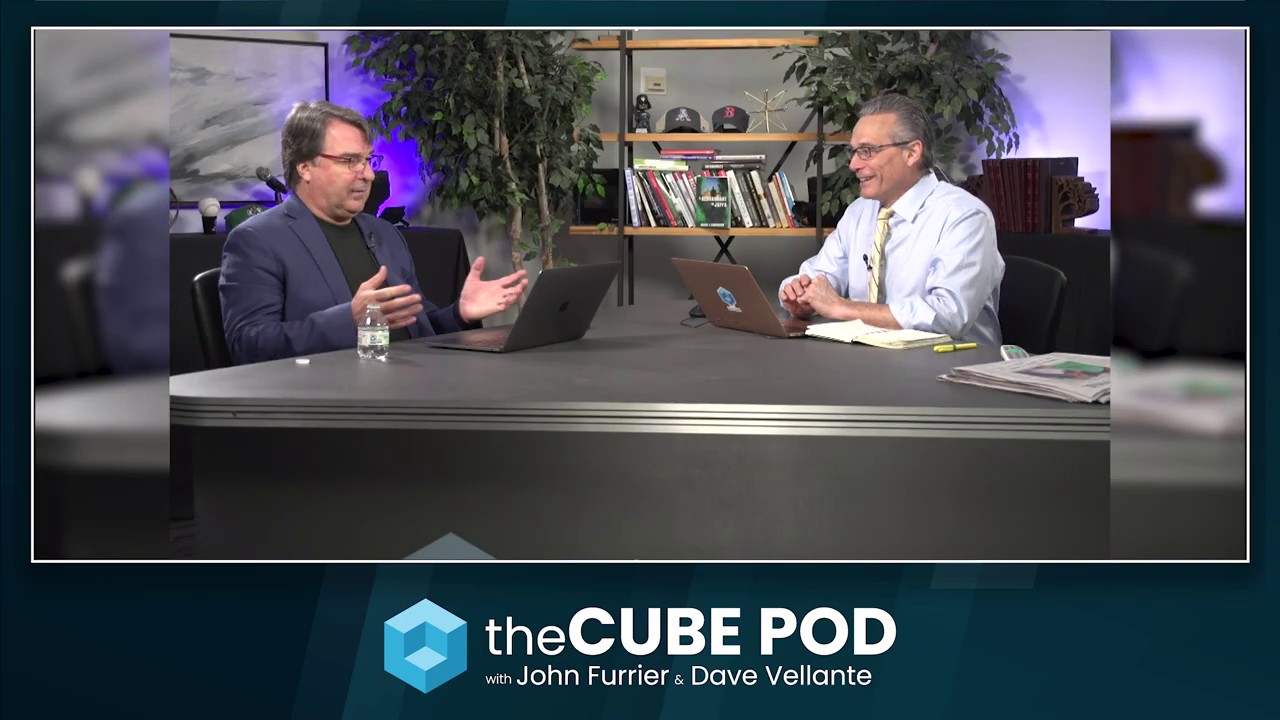 AI
AI
 AI
AI
 AI
AI
In a year poised for transformative advancements in artificial intelligence, leading tech companies are strategizing to harness its potential, focusing on deployment, economic impacts and innovation in the rapidly evolving tech landscape.
What’s interesting is that organizations are going deep into their strategy to unpack what their best narrative and posture is for the future AI wave, according to Furrier. That said, it’s important to remember that even during the pandemic, AI was always at the top of the spending momentum, added Furrier’s co-analyst Dave Vellante (right).
“Every company says, ‘We’ve been doing AI for a long, long time,'” Vellante said. “And, actually, it’s true from the practitioner standpoint. They weren’t doing gen AI, but they were doing AI. I think you’re right, a lot of these companies are going to be trying to figure out, ‘OK, what’s our stack look like?’”
The past few months have provided a look at such plans, including the Amazon Web Services Inc. gen AI stack. But the next year will be critical for companies such as IBM Corp., Oracle Corp., Hewlett Packard Enterprise Co. and Cisco Systems Inc., all of which will need to further their stories about what comes next.
While 2023 may have been a year of promise for AI, many view 2024 as a year in which real progress will start. So, will 2024 be the year of AI ROI?
“I think 2024 is going to be the year of AI deployment,” Furrier said. “You’re going to see people deploy AI and start to rationalize their product portfolios — and getting into the unit economics of where the economics will kick in for their business.”
The biggest AI “aha moment” this month for Furrier had to do with AI and tech literacy increasing. Soon, the world will see the impact of AI on the average consumer, where apps will begin to integrate into the life of an average citizen, he explained.
“I think that’s going to force businesses to make sure that their customers, the people using technology, have literacy,” Furrier said.
Reflecting on productivity strategies from a year ago, companies aiming to reduce spending primarily focused on consolidating and eliminating redundant vendors, according to Vellante. That’s changed today. Currently, companies are reducing staff.
“Now, I don’t have data that necessarily suggests it’s cause and effect, i.e., AI is enabling companies to reduce that staff,” Vellante said. “That’s either aspirational or they think they’re going to be able to reduce staff because of AI — or it’s actually happening.”
Many tech companies may be saying that they need to cut a percentage of its staff and will subsequently drive AI into an organization to make up for it. That could speak to Furrier’s earlier point about deployments playing out this year, according to Vellante.
“It’s going to impact … IT spending,” he said.
In early December, Broadcom Inc. announced it would let go of more than 1,800 VMware Inc. employees amid an effort to boost earnings. Broadcom’s plan moving forward has been received well by Furrier.
“Broadcom has a chip business, and they have a software business — VMware as a software part of their business,” he said. “What I like about Broadcom is they’re looking at their system architecture, and they’re just innovating faster.”
Competitors to Broadcom are going to have to meet the speed of the company’s technical innovation, Furrier added. That’s hard to do, given Broadcom changes the game a quarter a year with new developments.
“It goes faster, and it’s less expensive,” he said. “You add software to the thing, you’ve got chip to app, and what VMware cemented. All those acquisitions on the software side do for Broadcom, is it gives them more software in the stack. I think Broadcom will be a formidable player in that chip to app area.”
Julie Sweet, CEO of Accenture
Alan Cohen, general partner at DCVC
Meg Whitman, former president and CEO of HPE, U.S. ambassador to Kenya
Andy Jassy, president and CEO of Amazon
Pat Gelsinger, CEO of Intel
Kumar Sreekanti, venture partner at Atlantic Bridge Services
Sanjay Poonen, president and CEO of Cohesity
Hock Tan, president and CEO of Broadcom
Steve Jobs, co-founder and former CEO and chairman of Apple
Michael Dell, chairman and CEO of Dell Technologies
Howie Xu, SVP of engineering and AI/ML at Palo Alto Networks
Brett Hannath, CMO of Intel
Don’t miss out on the latest episodes of “theCUBE Pod.” Join us by subscribing to our RSS feed. You can also listen to us on Apple Podcasts or on Spotify. And for those who prefer to watch, check out our YouTube playlist. Tune in now, and be part of the ongoing conversation.
THANK YOU